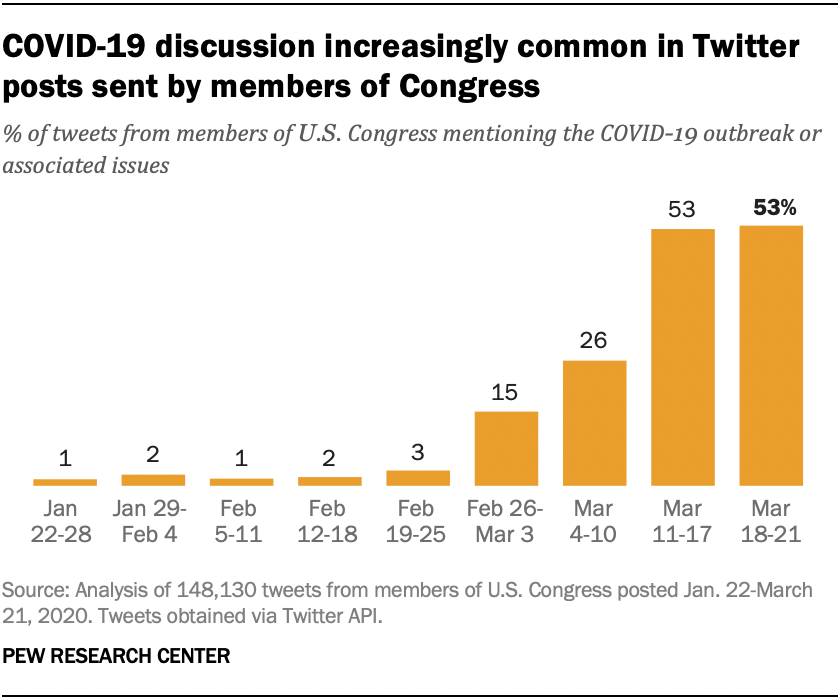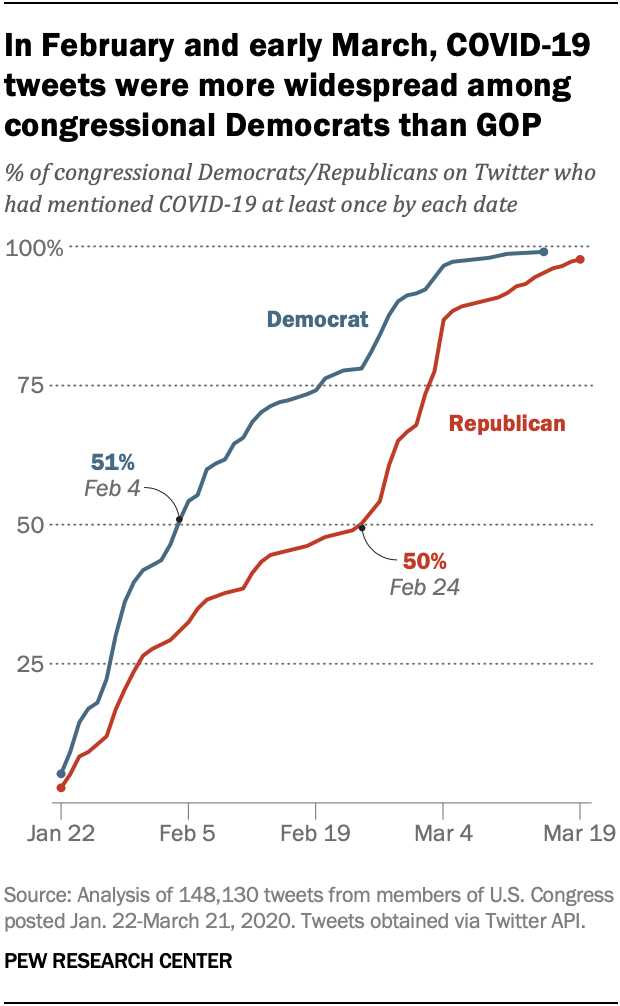 More than half of all tweets sent by members of the U.S. Congress between March 11 and 21 were related to the coronavirus outbreak, reflecting a dramatic increase since late January, according to a new Pew Research Center analysis. The surge in Twitter activity is one reflection of the extent to which COVID-19 has dominated discussion among lawmakers on Capitol Hill in recent weeks.
More than half of all tweets sent by members of the U.S. Congress between March 11 and 21 were related to the coronavirus outbreak, reflecting a dramatic increase since late January, according to a new Pew Research Center analysis. The surge in Twitter activity is one reflection of the extent to which COVID-19 has dominated discussion among lawmakers on Capitol Hill in recent weeks.
All told, members of Congress posted more than 27,000 tweets related to the virus or the events surrounding the outbreak from Jan. 22 through March 21.
These posts accounted for 19% of all congressional tweets sent during a time period that also included President Donald Trump’s Senate impeachment trial, the Iowa caucuses and the “Super Tuesday” presidential primaries.
To assess how federal lawmakers are talking about the current coronavirus pandemic, Pew Research Center collected all tweets from members of the U.S. Congress posted from Jan. 22-March 21, 2020, using the Twitter API. We then identified all tweets that directly discussed the COVID-19 outbreak or associated policy responses using a list of keywords (such as “virus,” “COVID” and “coronavirus”), and checked to ensure that human decisions largely agreed with the keyword-based estimates.
From this initial set of tweets about the outbreak, we then identified tweets about a variety of subtopics. Researchers built a supervised machine learning model to identify posts that supported or criticized the Trump administration’s response to the outbreak, based on a large sample of human-coded tweets. In addition, researchers used keywords to identify tweets encouraging healthy behaviors, as well as those using terms such as “China virus” or “racism.”
Here is the methodology for this report.
Tweets related to the outbreak were a relatively small share of congressional Twitter posts from Jan. 22 through Feb. 29 (fewer than 4% of all tweets posted during this time frame). Discussion of the issue began to pick up in late February and increased substantially in March, as 38% of all congressional tweets posted that month made reference to the outbreak in some way. Across this time frame, the median member of Congress mentioned the virus or ensuing outbreak in 40 individual tweets.
 Coronavirus-related Twitter posts made up a similar share of all tweets from Democratic and Republican members over the entire time window (18% for Democrats, 19% for Republicans), and by late March nearly every individual member of Congress had posted at least one tweet about the topic.
Coronavirus-related Twitter posts made up a similar share of all tweets from Democratic and Republican members over the entire time window (18% for Democrats, 19% for Republicans), and by late March nearly every individual member of Congress had posted at least one tweet about the topic.
But while similar shares of all tweets from congressional Democrats and Republicans referenced the issue, Democratic members tended to mention it earlier than Republicans. The Center estimates that half of all Democratic members had referenced the virus in at least one tweet as of Feb. 4, while it took until Feb. 24 for half of Republicans to do so.
Little praise of administration from Democrats – and little criticism of administration from Republicans
To gain a deeper understanding of how certain issues related to the virus are being discussed by lawmakers on Twitter, the Center also conducted a content analysis of these tweets. Researchers used a supervised machine learning approach to identify instances in which members tweeted their support or criticism of the Trump administration’s response to the outbreak.
During the time period evaluated, an estimated 9% of all tweets from Democratic members explicitly criticized the administration’s response, while 6% of all tweets from Republicans were explicitly supportive. Even though these posts made up relatively small shares of all tweets related to the virus, by March 21, 70% of Democrats had posted at least one tweet that included direct criticism of the administration and its response, and 70% of their GOP counterparts had tweeted at least once praising the administration on this issue. Tweets from Democrats that criticized the administration drew more audience engagement: a median of 145 likes and 50 retweets. Tweets from Republicans praising Trump received a more modest increase in engagement: a median of 59 likes and 18 retweets.
 It was extremely rare to find praise of the administration’s response to the outbreak from Democrats – or criticism of the administration from Republicans. In a hand-reviewed sample of more than 10,000 tweets about the virus, Center researchers found that fewer than half of 1% of tweets from Democrats praised the administration or its response. And an even smaller share of tweets from Republicans (less than one-tenth of 1%) directly criticized the administration in some way.
It was extremely rare to find praise of the administration’s response to the outbreak from Democrats – or criticism of the administration from Republicans. In a hand-reviewed sample of more than 10,000 tweets about the virus, Center researchers found that fewer than half of 1% of tweets from Democrats praised the administration or its response. And an even smaller share of tweets from Republicans (less than one-tenth of 1%) directly criticized the administration in some way.
Relatively few mentions of ‘Chinese virus’ or ‘Wuhan virus’ in congressional tweets
The Center also used keyword searches to understand broader themes in elected officials’ messages about COVID-19. A sizable share of tweets about the outbreak focused on information about how to engage in healthy behaviors. Around a fifth of all tweets by members of Congress about the coronavirus outbreak (22%) referenced terms such as “hand-washing” or “social distancing,” and nearly every member from each party posted at least one tweet of this type over the course of the study period.
Tweets tapping into some of the hot-button issues of the moment made up a much smaller share of the overall discussion. For instance, fewer than 1% of all tweets related to COVID-19 referenced the outbreak using terms that explicitly tied the outbreak to China or the Chinese people, such as “Chinese virus” or “Wuhan virus.” Half of these tweets (114 out of 228) came from Democrats, with all of them expressing concerns about racism or other perceived problems with those terms. The remaining 114 tweets were authored by Republicans, with none expressing concerns about the use of these phrases.
Researchers also examined a separate set of tweets that mentioned terms such as “racism” or “discrimination” in the context of COVID-19. Sometimes these tweets directly mentioned phrases such as “Chinese virus,” but they were often broader in nature, such as a tweet from Rep. Jackie Speier, D-Calif., saying, “Coronavirus doesn’t discriminate, neither should we…Illness should never be used to fan the flames of racism and discrimination.”
Tweets mentioning these terms were overwhelmingly posted by Democrats (91% of all such tweets were posted by Democratic members). When posted by Democratic members, these tweets tended to include statements of concern or support for Asian Americans or criticism of comments that others made tying the virus to China or its people. Republican tweets using these terms often suggested these concerns were overblown, as in a popular tweet from Rep. Lee Zeldin of New York, who wrote, “The coronavirus came from China. That’s not racist. That’s just a fact.”
Tweets using terms associated with racism or discrimination also drew higher levels of audience engagement than other COVID-19-related tweets, with tweets from Republican members being especially popular. The median coronavirus-related tweet posted by a GOP member and mentioning terms like racism or discrimination received 918 likes and 186 retweets, compared with 97 likes and 28 retweets for tweets by Democrats mentioning these terms.
Note: Here is the methodology for this report. Patrick van Kessel, Brad Jones, Hannah Gilberstadt, Aleksandra Sandstrom, Virginia Villa, Emma Remy, Dennis Quinn and Regina Widjaya contributed to this report.





